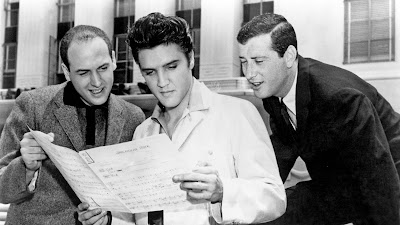I was inspired by a podcast called The 500 hosted by Los Angeles-based comedian Josh Adam Meyers. His goal, and mine, is to explore Rolling Stone Magazine's 2012 edition of The 500 Greatest Albums of All Time.
Album: #215
Album Title: Self-Titled Debut
Artist: New York Dolls
Genre: Hard Rock, Proto-Punk, Punk Rock, Glam Rock
Recorded: The Record Plant, New York City
My age at release: 8
How familiar was I with it before this week: A little
 |
| Robin Williams, Dustin Hoffman, Tom Hanks, Jamie Farr and Bugs Bunny were comfortable with drag performances. |
 |
| Australian comedian Barry Humphries performing in drag as his alter-ego Dame Edna - with Jay Leno (The Tonight Show). |
In fact, my dad remembers his father and uncles disappearing upstairs during parties to swap into women’s clothing, then returning to perform a song and dance routine. “It must be something peculiar to English men,” he says of the accepted practice. "Much like children 'dressing down' on New Year’s Eve as penniless urchins with soot-covered faces. They stormed into pubs pretending to clean-up and were tossed coins for their efforts by laughing patrons."
 |
| Philadelphia Mummer's Parade drag performers. |
 |
| Dr. Disc (circa 1985). Next door is The Silver Ball, an arcade that I helped finance - 25 cents at a time. |
 |
| New York Dolls debut record. (l-r) Kane, Sylvain, Johansen, Thunders and Nolan. |
 |
| A typical 80s arcade. The Galaga game (pictured right) likely depleted my bank account by $10 weekly throughout the early '80s. |
.jpg) |
| Cleese (left) as Mrs. Premise and Chapman as Mrs. Conclusion. |
 |
| Premise and Conclusion (Cleese & Chapman) crossing the channel to confer with Jean-Paul Satre in Paris. |
 |
| Former Saunders Music Teacher and Conductor, Gwyn Beynon. Recipient of the Golden Baton Award and on the Western University Alumni Wall of Fame. |
Mrs. Conclusion: "Why would you want a fruit that molests you?!"
Frustrated, Don's Mrs. Premise reached into his top to produce a grapefruit from inside the bra he was wearing -- borrowed from his mother.
Mrs. Premise: "Grapefruit! grapefruit! You daft woman -- these bloody things!"
Abruptly storming off the set we targeted unsuspecting classes -- interrupting lessons in an effort to pitch our sales catalogues.
 |
| Saunders Secondary School in London, Ontario. |
 |
| The Dolls in a promotional photo for Creem Magazine. |
.jpg) |
| The group KISS, looking Doll-esque, before they donned their trademark make-up. |
 |
| Out of drag, The Dolls pose with record producer, the legendary Todd Rundgren (3rd from right). |
.jpg) |
| Cover for the single release of Jet Boy and B-side Vietnamese Baby. |
Much like Python, there is the stuff I laughed about as an adolescent -- John Cleese performing his trademark "silly walk". Then, as I aged, I better understood the satire on bureaucratic inefficiency embodied in the entire premise of "A Ministry of Silly Walks" existing in proper British society. I think kids process a drag queen the same way -- in simple terms.I am sure children are more intimidated by the angry Proud Boys outside a Drag Queen Story Hour than they are by the funny looking lady who reads them a book with affected silly voices.
 |
| Proud Boys marching to protest a Drag Queen Story Hour juxtaposed against the event that creates their ire. |

.jpg)




.jpeg)

.jpg)







.jpg)













.jpg)





